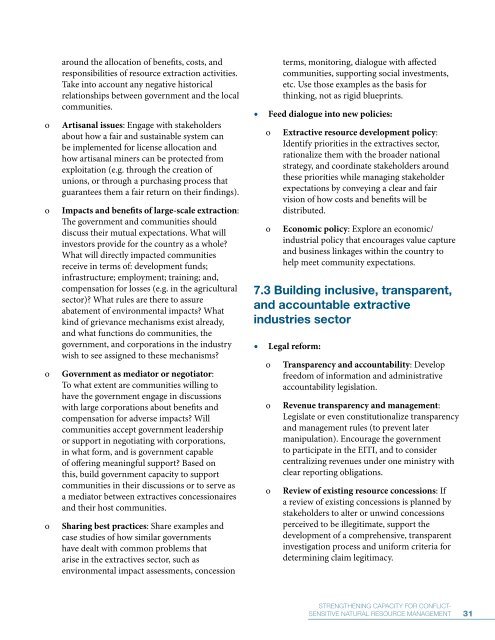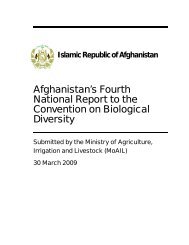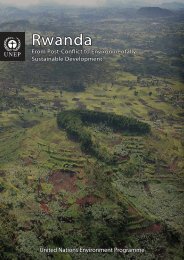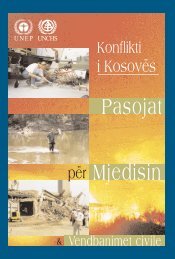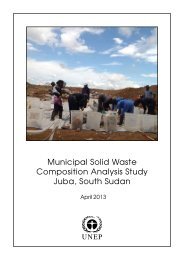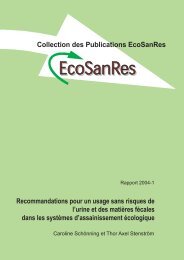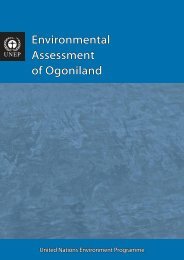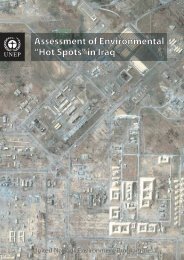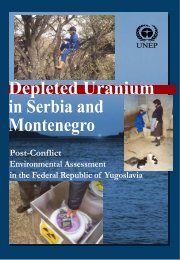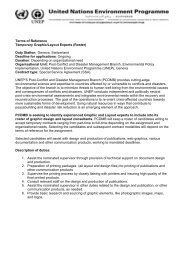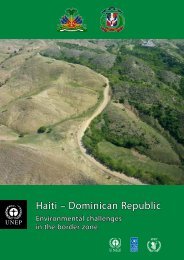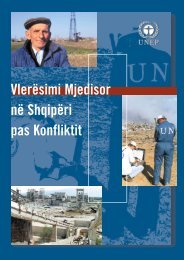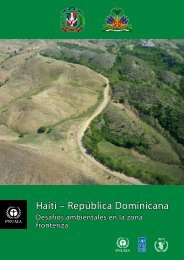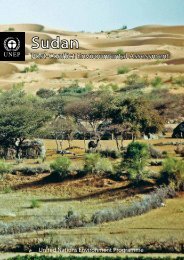Strengthening capacity - Disasters and Conflicts - UNEP
Strengthening capacity - Disasters and Conflicts - UNEP
Strengthening capacity - Disasters and Conflicts - UNEP
You also want an ePaper? Increase the reach of your titles
YUMPU automatically turns print PDFs into web optimized ePapers that Google loves.
o<br />
o<br />
o<br />
o<br />
around the allocation of benefits, costs, <strong>and</strong><br />
responsibilities of resource extraction activities.<br />
Take into account any negative historical<br />
relationships between government <strong>and</strong> the local<br />
communities.<br />
Artisanal issues: Engage with stakeholders<br />
about how a fair <strong>and</strong> sustainable system can<br />
be implemented for license allocation <strong>and</strong><br />
how artisanal miners can be protected from<br />
exploitation (e.g. through the creation of<br />
unions, or through a purchasing process that<br />
guarantees them a fair return on their findings).<br />
Impacts <strong>and</strong> benefits of large-scale extraction:<br />
The government <strong>and</strong> communities should<br />
discuss their mutual expectations. What will<br />
investors provide for the country as a whole<br />
What will directly impacted communities<br />
receive in terms of: development funds;<br />
infrastructure; employment; training; <strong>and</strong>,<br />
compensation for losses (e.g. in the agricultural<br />
sector) What rules are there to assure<br />
abatement of environmental impacts What<br />
kind of grievance mechanisms exist already,<br />
<strong>and</strong> what functions do communities, the<br />
government, <strong>and</strong> corporations in the industry<br />
wish to see assigned to these mechanisms<br />
Government as mediator or negotiator:<br />
To what extent are communities willing to<br />
have the government engage in discussions<br />
with large corporations about benefits <strong>and</strong><br />
compensation for adverse impacts Will<br />
communities accept government leadership<br />
or support in negotiating with corporations,<br />
in what form, <strong>and</strong> is government capable<br />
of offering meaningful support Based on<br />
this, build government <strong>capacity</strong> to support<br />
communities in their discussions or to serve as<br />
a mediator between extractives concessionaires<br />
<strong>and</strong> their host communities.<br />
Sharing best practices: Share examples <strong>and</strong><br />
case studies of how similar governments<br />
have dealt with common problems that<br />
arise in the extractives sector, such as<br />
environmental impact assessments, concession<br />
terms, monitoring, dialogue with affected<br />
communities, supporting social investments,<br />
etc. Use those examples as the basis for<br />
thinking, not as rigid blueprints.<br />
Feed dialogue into new policies:<br />
o<br />
o<br />
Extractive resource development policy:<br />
Identify priorities in the extractives sector,<br />
rationalize them with the broader national<br />
strategy, <strong>and</strong> coordinate stakeholders around<br />
these priorities while managing stakeholder<br />
expectations by conveying a clear <strong>and</strong> fair<br />
vision of how costs <strong>and</strong> benefits will be<br />
distributed.<br />
Economic policy: Explore an economic/<br />
industrial policy that encourages value capture<br />
<strong>and</strong> business linkages within the country to<br />
help meet community expectations.<br />
7.3 Building inclusive, transparent,<br />
<strong>and</strong> accountable extractive<br />
industries sector<br />
Legal reform:<br />
o<br />
o<br />
o<br />
Transparency <strong>and</strong> accountability: Develop<br />
freedom of information <strong>and</strong> administrative<br />
accountability legislation.<br />
Revenue transparency <strong>and</strong> management:<br />
Legislate or even constitutionalize transparency<br />
<strong>and</strong> management rules (to prevent later<br />
manipulation). Encourage the government<br />
to participate in the EITI, <strong>and</strong> to consider<br />
centralizing revenues under one ministry with<br />
clear reporting obligations.<br />
Review of existing resource concessions: If<br />
a review of existing concessions is planned by<br />
stakeholders to alter or unwind concessions<br />
perceived to be illegitimate, support the<br />
development of a comprehensive, transparent<br />
investigation process <strong>and</strong> uniform criteria for<br />
determining claim legitimacy.<br />
STRENGTHENING CAPACITY FOR CONFLICT-<br />
SENSITIVE NATURAL RESOURCE MANAGEMENT 31


